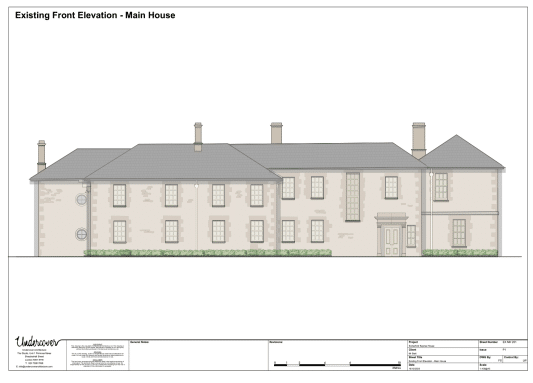

McLoughlin Planning with special thanks to Undercover Architecture, who worked with us on this project and provided the drawings, are pleased to have gained planning permission and listed building consent for the Grade II listed private house, Somerford Keynes House, in the Cotswolds.
Listed building features required for consent
The key areas that the owner wanted consent for were:
Contemporary Changes to the Main House
Alterations to the main house included in this recent granted permission were an addition of a French door with side lights to the side elevation, installation of rooflights in the roof valley between rafters (blocking up of a staircase to the basement with new staircase constructed to access cellar), and other minor workings such as the removal of modern partitions to allow for a more open plan space. In 2011, permission was granted for a stone porch to be added. This time round, a contemporary frameless glazed porch extension, complimented with a living green roof with pressed metal oversailing porch has been proposed to the side of the building to enhance a light and elegant feel to the house.
Family Orientated Outbuildings
In order for the outbuildings to have a more homely feel, internal changes were made to create larger spatial areas, including a raised ceiling, to accommodate for more bedrooms and a cosier setting at Kings Cottage. Proposed changes to the Coach House consist of a casement window to allow for an en-suit, which is located on the first floor to the linking section of the building. Originally, this wasn’t the case to be implemented, but due to concerns of excessive fenestration, the size of roof lights had to be changed and the dormer windows to be discarded. To allow for a modern way of travel and a tranquil Cotswold setting by the pool, an EV charging point and several air source heat pumps (ASHP), that are to be screened with timber for aesthetic purposes, were proposed.
Maintaining Historic Value and Consideration of Planning Policies
Overall, the proposed scheme has considered the historic value and beauty of the building’s original structure and the modern elements added to it over the years, therefore justifying that the new considered extensions and alterations granted for this permission will preserve the listed building for years to come. Additionally, careful considerations were sought out to ensure the development was aligned with legislation and policies, such as Section 16 of the NPPF (National Planning Policy Framework) for works to take place.
I’m a Listed Building Owner – When do I need to Acquire After Consent?
If you are a listed building owner and are wondering whether and/or when you need to acquire for listed building consent, please get in contact and one of our planning consultants will be able to assist. Additionally, please view our article here about when to acquire for listed building consent.
Joe Seymour – Associate Director
E: joe.seymour@mplanning.co.uk
T: 01242895008
We have a simple objective: to get results for our clients by providing high quality planning consultancy. That means our goal is to secure planning permission or an allocation for development.
We have used McLoughlin Planning (London) on two or three occasions and found them efficient, knowledgeable and excellent at negotiating with Local Authorities and third parties. Their concise and specific advice helped us win approval for schemes which had previously been notified for refusal. We would not hesitate using them again for planning issues in London.
Rob Haine Haine & Co. Ltd.Having worked with Nathan and his team for a number of years, I have found he offers a rare combination of intellectual rigour and practical focus, coupled with a commercial approach. He is solution orientated and capable of delivering on accelerated timelines for clients at the highest level with exacting standards and positive results.
Craig Jordan Jordan HennessyI have known Nathan for over 10 years and have used his services to great effect where professionalism, tenacity and a clear focus have been required, to deliver successful results. With a cool head, aligned with attention to detail and commercial acumen, he and his team work effectively and diligently and we look forward to engaging on other projects in the future
Grant Westall-Reece AvantWorking with McLoughlin Planning has been very enjoyable. I have always found the team knowledgeable and easy to work with. They have always been professional and have managed to achieve the results desired.
Matt Richardson Legal and General HomesWe have used Nathan and his team to help with a range of planning matters on a number of occasions. I have always found them to be extremely helpful, responsive and proactive. Nathan always makes himself available for phone calls and or meetings. He is especially patient and good at explaining complex matters in a very user friendly way.
Mark Lawson The Buying SolutionWe have worked with McLoughlin Planning for many years and have always been very pleased with level of service in helping us navigate the ever-changing planning system. I also never cease to be impressed by the answers to the completely random questions I ask Nathan about possible new sites, normally in several different locations at one go.
Ian Hitchings Partridge Homes (Cotswolds) LtdAfter many years of working with Nathan and his team, we know we can trust their planning opinion. They often provide a solution that demonstrates Planning experience and expertise and the benefit of their input is measured by the planning approval success and infrequent need to go to appeal on a decision.
George Paton WebbPatonWe have consistently used McLoughlin Planning to successfully promote greenfield development sites in a variety of locations. Aside from their technical capabilities, we also value their considered approach to projects - particularly when dealing with delicate and complex planning issues. This makes them a natural part of our team.
Alistair Watson Welbeck Strategic LandIf you are interested in finding out how we can help you please get in touch